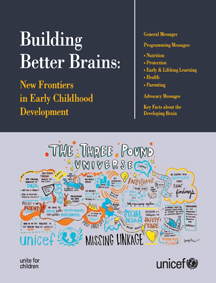A dvances in neuroscience are beginning to drive a revolutionary shift in the
way we think about child development, as we learn more about the impact
of both positive and negative experiences — and the interplay of experience
and genetics — on the developing brain. These developments have significant
implications for the future of millions of the world's most disadvantaged children
and their societies — and therefore for our work in both humanitarian and
development contexts.
The messages presented in this note were generated from a Neuroscience Symposium organized by UNICEF on April 16, 2014, where 16 leading international scientists from different fields of neuroscience presented their latest evidence on the influences of experience and environment on child brain development.
We now know that the brain is as influenced by its environment as it is by its genetic blueprint — and that there is an early window of opportunity to provide the nourishment, stimulation, and security children need for their brains need to develop fully — and to help fulfill their own potential. New frontiers of scientific inquiry are also exploring how parenting and caregiving may change the expression of genes in the brain, potentially affecting future generations.
Download File:
Building_better_brains_web





























